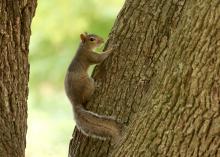Information Possibly Outdated
The information presented on this page was originally released on July 24, 2015. It may not be outdated, but please search our site for more current information. If you plan to quote or reference this information in a publication, please check with the Extension specialist or author before proceeding.
Control, manage squirrels on your property
STARKVILLE, Miss. -- Squirrels look cute and cuddly, but anyone who tries to feed birds knows they can be persistent thieves at the bird feeder.
Although squirrels traditionally gather nuts, seeds, acorns, mushrooms, insects and leaves from forested habitats, they also enjoy readily available food from backyard and agricultural habitats, which often causes conflict between squirrels and homeowners.
Orchard crops, such as pecans, can lose significant revenue from squirrel damage. Homeowners placing feeders intended for birds can also face an ongoing struggle with squirrel thieves. Sometimes, squirrels chew the openings of birdhouses so they can get in and eat nesting songbirds. Flying squirrels are small enough to enter most birdhouses and are especially likely to eat nesting birds.
Squirrels occasionally damage lawns by burying or digging up nuts. In gardens, squirrels may eat planted seeds, mature fruits or grains such as corn. They also will chew bark and clip twigs on ornamental trees or shrubbery planted in yards. In residential areas, squirrels sometimes travel power lines and short out transformers. They gnaw on wires, enter buildings and build nests in attics. Fox squirrels can cause damage to loblolly and other pine trees by chewing bark from branches and trunks.
Squirrel damage can be prevented in several ways. First, to protect young trees, encircle the tree with a 2-foot-wide metal collar about 3 to 4 feet off the ground. This barrier will prevent squirrels from climbing and chewing on trees. The metal collar will also work if placed around power poles to discourage animals from travelling on wires.
Close any openings into or out of attics and other buildings to prevent squirrels from entering. But take care not to lock the squirrels inside where they could do considerable damage trying to chew their way out. Cover openings with heavy wire mesh or solid metal panels. Electrified fencing can help prevent orchard or garden damage. However, squirrels can squeeze through very small openings and are proficient at jumping.
Trimming tree leaves and branches near a garden or orchard may prevent squirrels from being able to jump onto rooftops and making their way down to food sources. Providing an alternative food source for squirrels, such as an ear of corn or container of seeds, might deter squirrels from damaging garden or orchard crops. In extreme situations, taste repellents such as Ro-pel can be applied to seeds, bulbs, flowers, trees and poles.
Mississippi is home to three species of squirrel and several subspecies. Most common are the eastern gray squirrel and the eastern fox squirrel, but we also have southern flying squirrels. The gray squirrels are predominantly gray, but they can sometimes look red, black or even white. They have pink-colored paw soles and a thick, gray, bushy tail. The orangey-colored fox squirrel is considerably larger than the gray squirrel and has a characteristic black mask and white colorations on the nose, ears and paws.
Both types of squirrels prefer mature forest as their primary habitat but will also nest in tree cavities and some human-built nesting boxes. The squirrel nest -- called a drey -- is recognizable by its messy twig and leaf structure. Although squirrels can often be a nuisance to homeowners, it is important to note that they do not pose considerable harm to humans. They can be carriers of ticks, mange, fleas and intestinal parasites, but these issues do not impair the quality of squirrel meat for eating. Homeowners should keep pets up to date on vaccinations and parasite control.
Squirrels are a native and important component of the Mississippi forest ecosystem. They help with insect and wild nut control. They also provide an important food source for hawks, owls, snakes and some mammalian predators.
If squirrels are an ongoing problem, exclusionary and diversionary tactics are the most effective. Squirrel hunting is also a legal and humane method of controlling squirrel populations in Mississippi. Be sure to check the Mississippi Department of Wildlife, Fisheries and Parks website for squirrel hunting seasons and regulations at http://www.mdwfp.com.

Editor’s Note: Extension Outdoors is a column authored by several different experts in the Mississippi State University Extension Service.




